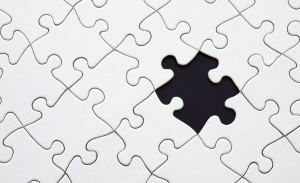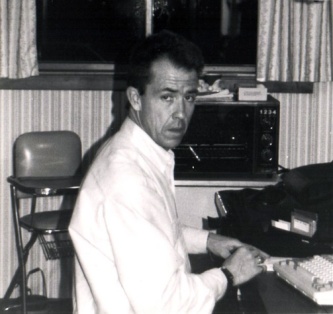My dad came to see me twice last month.
Like every other time he has visited in the four years since his death, the next morning I awoke with a mix of thrill at visualizing him so clearly, and sadness knowing it was just a dream. It’s no surprise he showed up; I found out about that time I was to have a piece of mine published in The New York Times, his favorite paper.
My father was a fabulous writer. His voice was strong, his prose fluid and conversational; but Dad directed most of his talent toward the academic realm. He wrote textbooks, research papers and journal articles. Even now when I flip through the pages, tapped out with two, furious index fingers because he never learned to type, I can see his love of the craft. Never boring or stilted, he managed to make psychological concepts and theories not just digestible for the average undergrad, but entertaining — no small feat. At the end of his life Dad began recording more of his personal history, too, but most of what he wrote can be found in a college library.
He was also a voracious reader. A quick look at his nightstand would reveal his taste. Dad nearly always had three books going at once: an Elmore Leonard-ish crime novel, a current, political non-fiction, and a memoir. As I grew older and our tastes began to fall in line, it became more and more fun to compare notes on what we were reading and trade recommendations, but it was tough to keep up with him. Dad read fast and his appetite was huge.
What never changed, however, was the daily copy of The New York Times, tucked under his arm, which accompanied my father everywhere he went. Whenever we traveled overseas (which was frequently), at any hotel his first request was always a copy of the Times. Dad consumed the world through that paper; he read it cover to cover. I know he had at least one Letter to the Editor published, which he considered a major accomplishment.
A couple of months ago, when I submitted my piece to the NYT Motherlode, I knew there was a possibility it would be published, but that chances were slim. After I read the email confirming it had been accepted, I cried. Out of pride, out of relief, out of confidence that someone as esteemed as editor KJ Dell’Antonia believed in my voice, but mainly because I wouldn’t be able to hear my dad congratulate me. I wanted, so badly, to pick up the phone and call him with the news. To listen to his voice raise an octave and somehow soften at the same time when he said “Wow, honey, that’s a big deal! The New York Times, that’s spectacular!”
We didn’t have everything in common and ours was a relationship that suffered its share of ups and downs, but when it came to writing, we were totally in sync. And mine made him proud. “My daughter the writer,” Dad said over the phone when my first piece was published in a widely circulated magazine. I could hear his smile.
In other areas of my life, Dad’s reactions left me wanting. Like many fathers whose primary focus was work, I found it tough to hold his attention for long. My trust in him suffered after too many of my attempts to engage him fell flat, leaving me heartbroken, so I rarely approached him with tender or personal issues. Instead the bond we shared was a cerebral one: A love of all things pop culture and literary. When we talked books, movies or current events his eyes, which were one of the many features we shared in common, came alive. We discussed and debated, compared and contrasted, jabbed and joked. I felt important, smart and admired. Connected. Loved.
My trust in him suffered after too many of my attempts to engage him fell flat, leaving me heartbroken, so I rarely approached him with tender or personal issues. Instead the bond we shared was a cerebral one: A love of all things pop culture and literary. When we talked books, movies or current events his eyes, which were one of the many features we shared in common, came alive. We discussed and debated, compared and contrasted, jabbed and joked. I felt important, smart and admired. Connected. Loved.
Maybe his response about my piece, “After Cancer’s Calm, a Daughter’s Emotional Storm” would have left me deflated as he had in other areas of my life. I will never know. That is both the blessing and the curse of death: I can write the script. At once I can both mourn the loss of his praise, and protect myself by not risking the crushing blow of his ambivalence.
Like so many others, this experience will be projected onto the screen of my heart, already crowded with images of disappointments and joys I have ached to share with my father since he died. Time passes, but love and longing never do. Neither does the desire to hear the one voice whose validation often carried the most weight in my life, good and bad.
I miss you, Dad. I love you. Come back and see me any time.



I relate Betsy. My dad was proud of me, too. But he never really “got” my writing. I showed him a piece once that I wrote for my college newspaper about being the first person in my family to go to college. Instead of hearing me say that I was grateful for the opportunity and the sacrifice my parents made for me, he thought I was shaming him. I never shared my writing with him again after that. He died from colon cancer when I was 24.
LikeLike
Wow, that’s so young to lose a parent, Gail. In some ways, have two parents in academia was a lot of pressure. Mine was a “scenic” route to graduation from college, and though he never voiced it, I wonder if it frustrated my dad that it took me so long to finish my degree.
LikeLike
It’s hard not to have expectations of your children. I didn’t understand that when I was young. Mine wanted me to adopt their politics and religion and were disappointed that I didn’t. I wanted mine to go to college and couldn’t believe that they had no interest when it was foundational for me. Through it all, I’ve learned to love them on their own terms and to support their dreams and career paths, even when I see them struggle because of their choices.
LikeLike